Redditor Refuses To Fill Their Dog's Anxiety Prescription So Her Boyfriend Could Give The Drugs To His Dog
Acquiring a new pet can bring joy and happiness to a household, but it also comes with its own set of challenges. Along with providing love and affection, pet ownership requires a significant amount of time, effort, and resources, including providing proper care, food, exercise, and veterinary care.
Unfortunately, many people out there don't understand that. OP recently acquired a second dog, who came scratching at their door.
After trying to find the dog's owner and failing, OP decided to keep the dog, with the understanding that their partner would pay for the new dog's vet visits. However, OP's partner was giving the new dog OP's dog's anxiety medication without their knowledge, which made the new dog not as easy-going as previously thought.
OP told their partner to either take the dog to the vet or a trainer or take the dog to the shelter, but their partner has yet to do so. OP's partner is now calling OP an "asshole" for not refilling their dog's anxiety medication prescription, which was for situational anxiety and had no refills.
Despite their partner offering to pay for it, OP is hesitant to refill the prescription because they don't trust their partner to follow through on their promises. Now, they are being told that they are objectively the "asshole" in the situation and are asking if this is true.
Read the full story below:
OP asks:

OP recently acquired a second dog, who came scratching at their door. OP decided to keep the dog, with the understanding that their partner would pay for the new dog's vet visits.
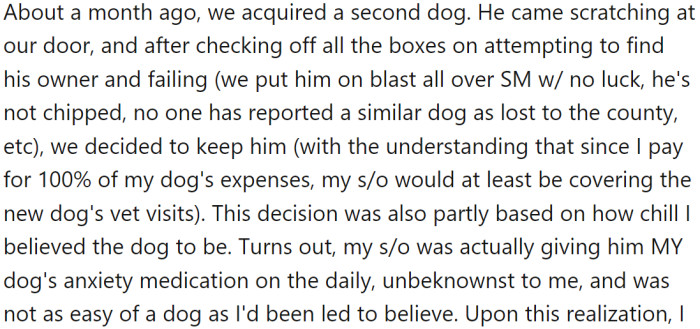
However, OP's partner was giving the new dog OP's dog's anxiety medication without their knowledge, which made the new dog not as easy-going as previously thought.
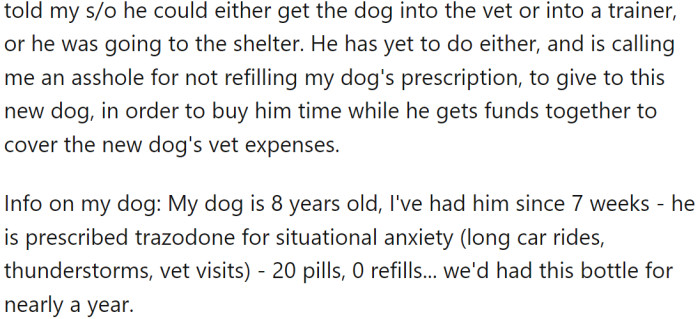
The Impact of Anxiety on Pets and Owners
Pet ownership carries significant emotional responsibilities, particularly when it comes to managing a pet's health, including anxiety. Research shows that pets can experience anxiety just like humans, and their well-being often reflects the emotional state of their owners. This interconnectedness indicates that owners must approach their pets' care with empathy and understanding.
In this case, the reluctance to fill the dog's prescription may be rooted in a misunderstanding of the importance of medication for managing anxiety, which can lead to behavioral issues if left untreated.
Understanding Anxiety Disorders in Pets
Dr. Sarah Wells, a veterinary behaviorist, explains that anxiety disorders in pets can manifest in various ways, often leading to challenging situations for their owners. Many pet owners may not recognize the signs of anxiety, which can include destructive behavior, excessive barking, or even aggression. Research indicates that a significant number of pets experience anxiety, particularly in stressful environments or with changes in routine.
In this context, managing a pet's anxiety requires a comprehensive understanding of their needs and behaviors. It's essential for pet owners to educate themselves about anxiety management techniques, which can enhance their pets' quality of life and strengthen the human-animal bond.
The Impact of Trust in Relationships
This scenario illustrates the critical role of trust in relationships, particularly when it comes to shared responsibilities and decision-making. Research from the Journal of Social Psychology emphasizes that trust is foundational for healthy partnerships. When trust erodes, it can lead to feelings of betrayal and resentment, as seen in this situation.
It's essential for partners to establish trust through open communication and transparency. When one partner feels their needs are being overlooked, it can create an environment of suspicion that undermines the relationship.
Understanding Anxiety and Medication Use
Dr. Michelle Harper, a clinical psychologist specializing in anxiety disorders, notes that medication can be a critical component of managing anxiety in pets. However, it’s essential to ensure that the right dosage and treatment plan are followed, as improper use can lead to further complications.
Research indicates that adherence to prescribed treatments is vital for both pet welfare and owner peace of mind, highlighting the need for responsible communication and usage.
Despite their partner offering to pay for it, OP is hesitant to refill the prescription because they don't trust their partner to follow through on their promises.
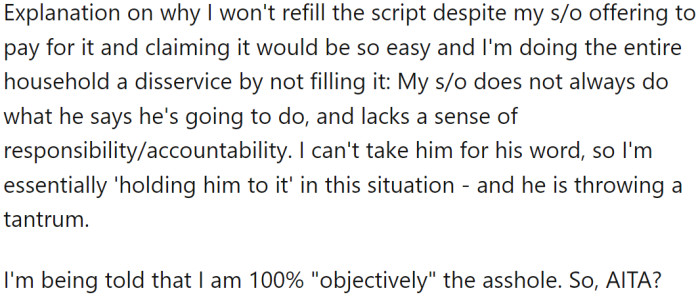
OP has offered the following explanation for why they think they might be the a-hole:

Some Redditors were harsh
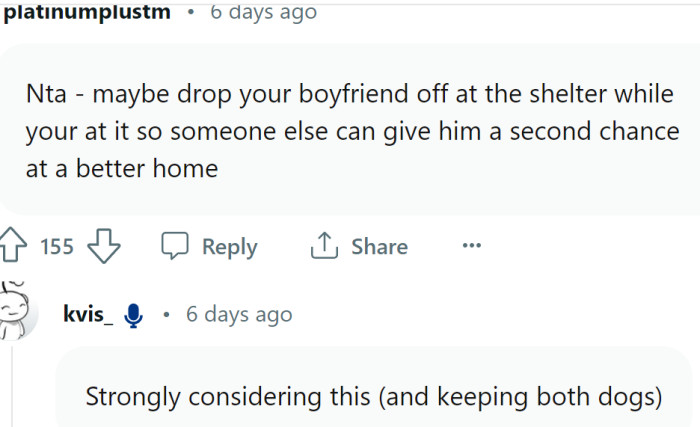
The concept of shared emotional experiences is crucial in pet ownership. Studies indicate that pets often mirror the emotional states of their owners, creating a feedback loop that can exacerbate issues of anxiety or distress. Understanding this dynamic can help owners recognize the importance of addressing their pets' mental health needs, which often parallels their emotional well-being.
Thus, ensuring that pets receive appropriate care not only benefits the animal but can also enhance the owner's emotional resilience.
In relationships, differing views on pet care can lead to significant conflicts. According to studies in family psychology, when partners have conflicting beliefs about animal care, it can create tension and misunderstandings. This is particularly evident when one partner feels strongly about using medication while the other is hesitant or opposed.
To address these conflicts, open communication about each partner's concerns and expectations is vital. Engaging in discussions about the reasons behind their beliefs can foster understanding and promote collaborative decision-making regarding pet care.
Moreover, the dynamics of power in relationships can exacerbate trust issues. A study published in the Journal of Personality and Social Psychology indicates that imbalances in decision-making power can lead to conflicts and feelings of helplessness. In this case, one partner taking unilateral actions without consulting the other can create feelings of disempowerment.
Addressing these power dynamics is crucial for restoring trust and ensuring both partners feel valued in the relationship.
Behavioral specialists emphasize that sharing medications between pets can create significant health risks. A study published in the Journal of Veterinary Medicine highlights the importance of understanding the specific needs of each animal to avoid adverse effects.
When one pet is given another's medication, it undermines the individualized care necessary for optimal health.
Humans shouldn't take meds that aren't prescribed to them, and the same goes for dogs.
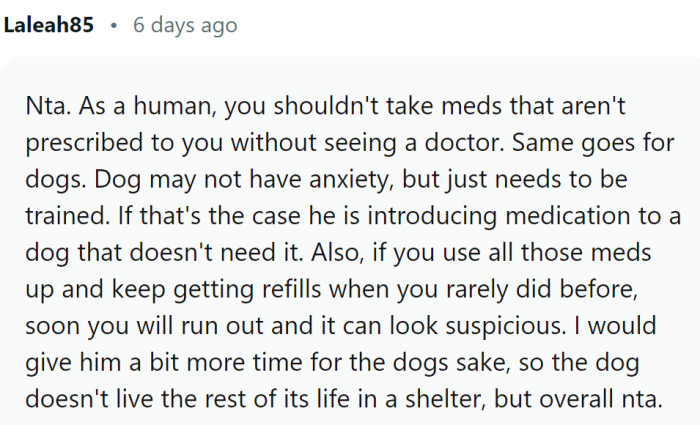
This happens often, it seems

Some people see bigger problems:
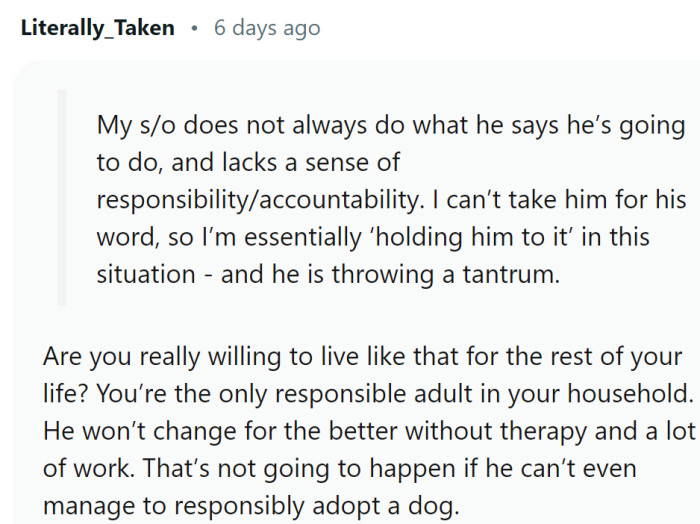
Communication in Relationships: Understanding Needs
Effective communication is critical in relationships, especially when it comes to discussing pets' health. Dr. Michele Weiner-Davis, a renowned marriage therapist, states, "Open dialogue about expectations and responsibilities is essential for a healthy partnership." In this case, discussing the need for medication openly could help clarify misunderstandings and align expectations. Encouraging a team approach to pet care can foster collaboration rather than conflict, allowing both partners to feel valued in their decision-making roles. For more insights, visit Dr. Michele Weiner-Davis' website.
The Importance of Boundaries in Relationships
Setting boundaries is a fundamental aspect of healthy relationships, especially when it comes to pet care. Dr. Rachel Simmons, a psychologist specializing in interpersonal relationships, emphasizes that establishing clear boundaries can prevent conflicts and foster mutual respect. Research shows that individuals who communicate their boundaries effectively are more likely to experience satisfaction in their relationships.
In this case, the refusal to fill a prescription without proper consent reflects a need for clear boundaries regarding pet care responsibilities. Encouraging partners to discuss and establish these boundaries can help create a more harmonious living environment.
Communication as a Tool for Building Trust
Effective communication is vital for rebuilding trust in relationships. Research shows that couples who engage in open and honest discussions about their feelings and needs are more likely to restore trust. According to findings from the Journal of Family Psychology, practicing active listening can enhance understanding and empathy, allowing partners to reconnect.
Using 'I-statements' can also facilitate constructive conversations, helping individuals express their feelings without placing blame. This approach can create a safe space for dialogue, fostering a sense of partnership and collaboration.
The Importance of Responsible Pet Ownership
Responsible pet ownership encompasses understanding the unique needs of each animal. When individuals fail to recognize these differences, it can lead to detrimental health outcomes. As Dr. Ramani Durvasula, a clinical psychologist, states, "Understanding the emotional and psychological needs of pets is crucial for their well-being." This highlights the responsibilities of pet owners in providing tailored care for their animals. Understanding these responsibilities can empower owners to make informed decisions about their pets’ health.
It is hard to beleive
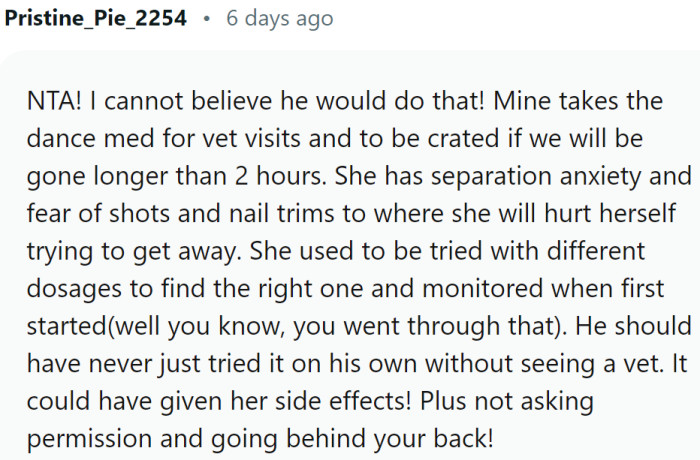
What was the plan?
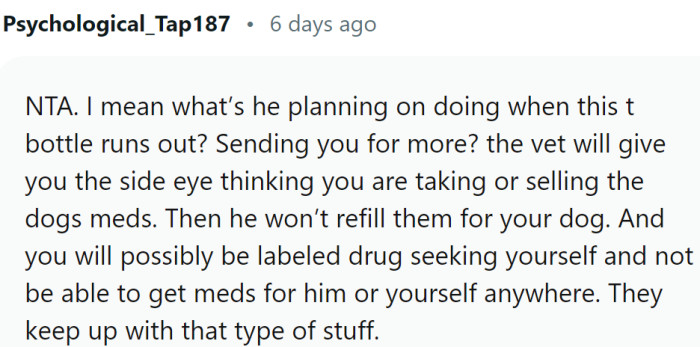
There are so many issues there
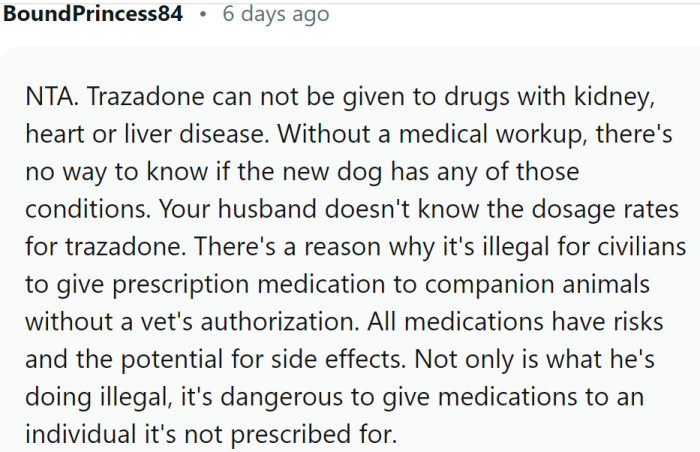
To improve communication, it may be beneficial for both partners to engage in joint problem-solving discussions. This could include setting a shared goal for their dog's health and exploring solutions together, like researching the benefits of anxiety medications. Additionally, attending veterinary appointments together can strengthen their understanding and commitment to their pet's well-being, ultimately enhancing their relationship.
Utilizing these strategies may help bridge any gaps in understanding and improve both the pet's and the owners' emotional states.
To improve communication about pet care, couples can benefit from engaging in mutual decision-making processes. Research from the Journal of Family Psychology suggests that collaborative problem-solving can enhance relationship satisfaction, particularly in situations involving shared responsibilities. By discussing pet care openly, couples can ensure that both partners feel heard and valued in their decision-making.
Additionally, providing educational resources about pet anxiety and its management can empower both partners to make informed decisions together, fostering a sense of teamwork in caring for their pet.
Additionally, establishing clear boundaries regarding responsibilities can help rebuild trust. Research indicates that couples who define their roles and expectations tend to experience fewer conflicts. A practical approach involves discussing each partner's responsibilities openly, ensuring that both feel heard and respected in their contributions.
This collaborative effort can enhance the relationship's overall health and satisfaction, leading to a more harmonious partnership.
To prevent the misuse of medication among pets, experts recommend developing clear guidelines for medication use. Creating a shared understanding among pet owners about the specific needs and treatments for each animal can foster a safer and healthier environment.
Some red flags appearing:
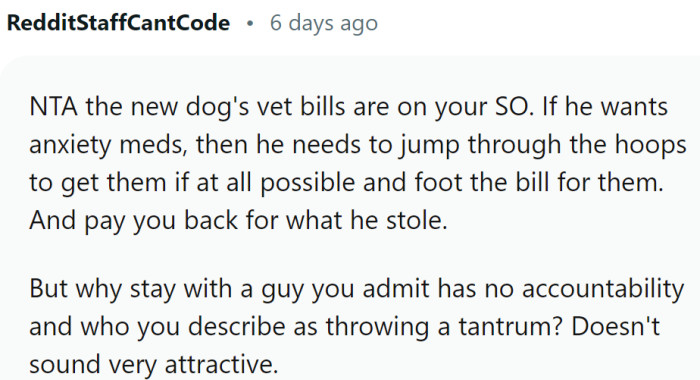
Maybe OP should do this:

The story of OP and their partner highlights the challenges and responsibilities that come with pet ownership. It shows the importance of clear communication and trust in relationships, especially when it comes to the care of a pet.
The situation raises questions about the role of each person in a relationship and the responsibilities they have towards the pets they share. Whether or not OP is the "a-hole" in this situation is subjective and open to interpretation, but the story serves as a reminder that pet ownership is a significant commitment and requires a lot of time, effort, and resources.
It also highlights the importance of being aware of the needs and well-being of all pets in a household and taking steps to ensure they are properly taken care of.
Communication and Collaboration in Pet Care
Effective communication between pet owners is essential for ensuring the well-being of animals. A family therapist might suggest establishing open lines of dialogue regarding pet care practices to prevent misunderstandings and promote responsible ownership.
Research indicates that collaboration among pet owners can significantly enhance the effectiveness of treatment plans and ensure that each animal's needs are adequately met.
Ultimately, fostering a culture of accountability and communication can improve the overall health and happiness of pets. Regular check-ins about medication and care can help ensure that all pets receive appropriate attention and treatment.
Psychological Analysis
This situation highlights the complexities of managing pet care in shared living situations. It underscores the importance of clear communication and understanding to ensure each pet's needs are met appropriately.
Analysis generated by AI
Analysis & Alternative Approaches
Experts agree that responsible pet ownership requires understanding and communication among pet owners. Developing clear guidelines for medication use can foster a healthier environment for pets. As Dr. Daniel Goleman, psychologist and author of "Emotional Intelligence," states, "Understanding our pets' emotional needs is crucial for their well-being." Additionally, Dr. Helen Graham, a veterinary behaviorist, emphasizes that "clear communication about medication and care is essential for maintaining a healthy bond between pets and their owners."
Psychological Analysis
This situation highlights the vital role of trust in relationships, especially regarding shared responsibilities. It’s crucial for partners to communicate openly about their needs and expectations to prevent misunderstandings. By fostering transparency and collaboration, couples can build a stronger foundation of trust and mutual respect.
Analysis generated by AI
Analysis & Alternative Approaches
In summary, trust is a fundamental element in relationships that requires ongoing effort and communication. By addressing power dynamics, fostering open dialogue, and establishing clear boundaries, couples can work towards rebuilding trust. Ultimately, a strong foundation of trust enhances the relationship's overall satisfaction and longevity.
Psychological Analysis
This situation reflects common challenges in pet ownership, particularly when partners have differing views on care. The emotional attachment to pets can amplify conflicts, making it crucial for couples to communicate openly and establish shared responsibilities. Encouraging discussions about pet care can help foster understanding and collaboration, ultimately benefiting both the pets and their owners.
Analysis generated by AI
Analysis & Alternative Approaches
Understanding the dynamics of pet anxiety and the importance of clear communication can significantly enhance relationships. By fostering open discussions about pet care responsibilities and establishing boundaries, couples can navigate conflicts more effectively. Ultimately, prioritizing the well-being of pets while honoring each partner's perspectives can lead to healthier relationships and happier pets.
Psychological Analysis
This situation highlights the challenges of shared responsibility in pet ownership, particularly concerning mental health needs. The refusal to fill the prescription suggests a potential disconnect in understanding the importance of addressing anxiety in pets, which can reflect broader communication issues in the relationship.
Analysis generated by AI
Analysis & Alternative Approaches
Understanding the emotional dynamics of pet ownership reveals how interconnected the well-being of pets and their owners can be. Research indicates that addressing pet anxiety is a shared responsibility that can enhance relationships.
By fostering communication and collaboration, couples can create a more supportive environment for their pets, ultimately benefiting each partner's emotional health.



